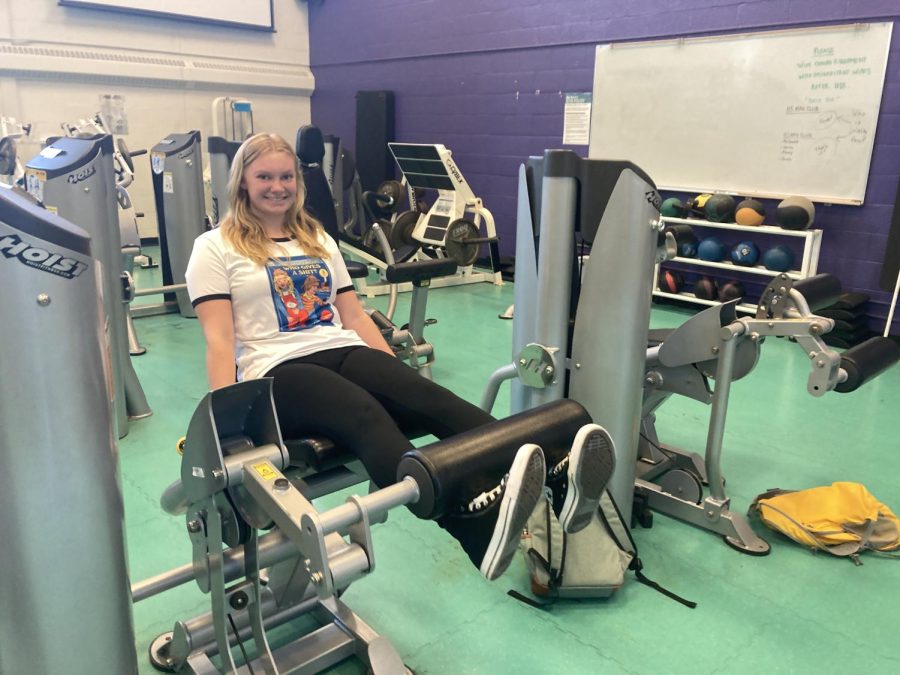Riverhawks athletes share workout and diet routines
Women’s cross-country runner Noelle Somers, a first year transfer studies student, ran three to five miles five to six days a week to prepare for the 2022 season. Somers also trained in the weight room during the offseason.
September 8, 2022
Riverhawks athletes said they have been eating healthy and working out in the offseason to prepare for the upcoming year.
Women’s cross-country runner Noelle Somers runs three to five miles five to six days a week. She trains at her gym three days a week to target core, biceps and legs.
Somers, a first-year transfer studies student, said she feels good after running.
“It’s amazing after you do a long run and you feel so proud of yourself,” Somers noted. “But also [running is] not only conditioning you to run, it’s also maintaining a healthier part because you’re not just sitting at home, you’re getting out there running around your neighborhood or running around a park.”
Women’s cross-country had its first match on Sept. 1.
First-year transfer studies student Bailey Healy, who runs cross-country, trains four days a week. On Mondays and Tuesdays, she works chest and triceps. On Thursdays and Fridays, Healy trains legs and shoulders, and runs throughout the week.
After training in the offseason, Healy said she saw results.
“I was still able to come back and be able to run four miles with ease just because of all that training that I had done constantly for the past four years,” Healy said. “So definitely staying with it helps a ton.”
Healy said eating healthy is important for athletes.
“I’ve seen a couple of kids who eat a pack of chips before going on a run and M&Ms,” Healy said. “That’s just not going to help you. It’s not going to put fuel into your body and it definitely would die out a lot faster than someone who was eating an orange or something that would provide them with a little bit [of] energy.”
Healy added she includes protein, fruits, vegetables and carbohydrates in her diet.
Men’s basketball shooting guard and small forward Nick Augusterfer lifts weights at 5 a.m. six days a week and runs two miles every day. He eats 3,600 calories a day.
“I do three eggs and half a cup of egg whites before my lifts,” Augusterfer, a first-year law enforcement and criminal justice student, noted. “After my lifts [I eat] protein oatmeal. [For] lunch, [I eat] usually chicken and rice and a protein shake. And then I just have a snack in the afternoon. [My other lunches are] just straight protein [which are] steak [and] chicken.”
Augusterfer said athletes won’t progress if they don’t workout or eat healthy in the offseason.
“They’ll probably stay the same,” Augusterfer said. “But if their teammates and opponents are working out in the offseason, they’re going to progress to be better.”
Third-year communications student Payton Williams agreed.
“I think that a big thing with sports nowadays is [to get in the best] shape,” Williams said. “It’s hard to perform at a high level if other guys are more athletic and other guys have prepared their bodies a little bit more than you because you haven’t been working out. [If] you get tired easily or you’re not in the right shape, that leads to injuries. So you can’t really play if you’re on the sidelines and then at the trainer’s office.”
Williams played summer lacrosse to prepare for the 2023 spring season. Also this offseason Williams has included three to four days of weightlifting a week while incorporating cardio.
“Weightlifting has been good,” Williams, who will play attack in 2023, said. “My max bench went from 225 to 245, which is good numbers, in my opinion, and my squat [is] still getting up there. [I’m] still working on it a little bit [and I’m] trying to diet right so I [can] make the gains I need to in the weight room.”
Williams noted working out benefits him.
“A sport like lacrosse has a lot of ups and downs,” Williams said. “It’s a lot of running so you’ll see a lot of guys pull and tear things [because] they haven’t been dieting or in the weight room to prepare their bodies to be running so much.”
Williams has lost 15 pounds this offseason.












